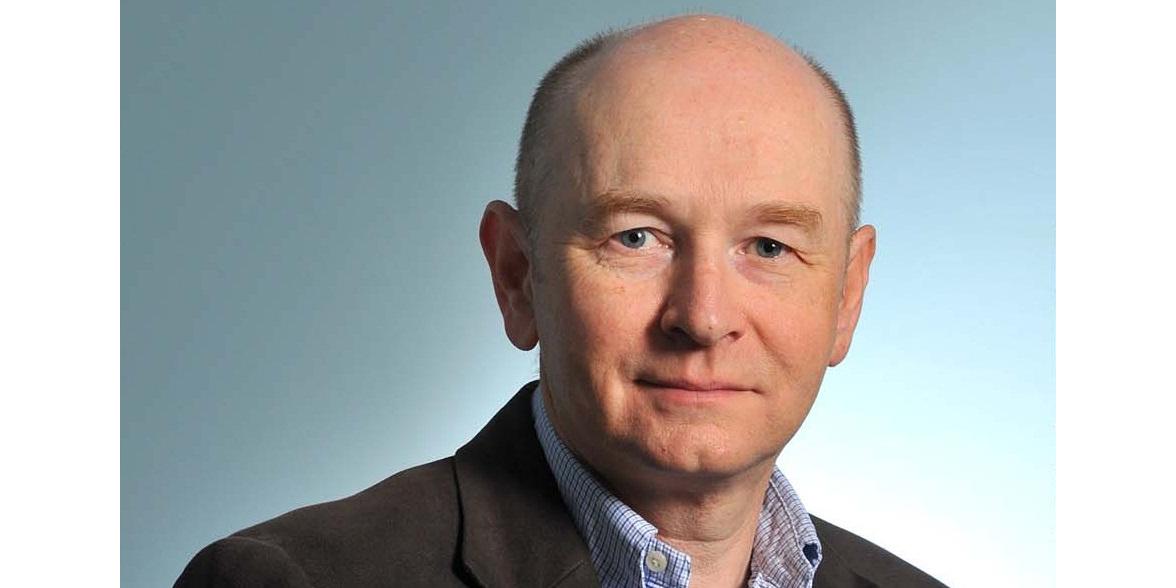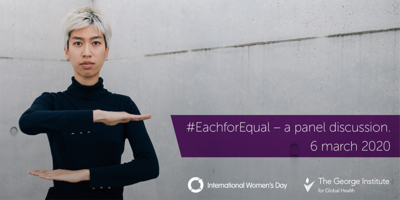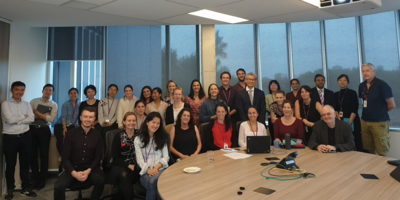This week is International Men's Health Week. Men are less inclined than women to actively maintain their health and receive far less information than women do about the importance of their health and wellbeing. They are also less likely to seek professional help for problems, particularly those of an emotional nature.
To celebrate and raise awareness of men’s health and mental wellness, some of The George Institute’s men share what wellness means to them and how they have been coping during COVID-19:
What does “men’s health” and “mental-health wellness” mean to you?
Gian Luca
Mental health wellness is a vital part of the individual’s overall health but is often overlooked by men who sometimes prefer to suffer in silence because they find it difficult to seek support. Making the decision to talk about it takes courage as men are often raised in a way that encourages them to hide weaknesses. Unfortunately, young boys too often still hear phrases like ‘boys don’t cry’. This can often lead boys and men to be ashamed of their anxiety, depression or stress and they might fear to show vulnerability.
John
One way to look at these terms is to see them as levers to open the conversation with men who are notoriously reluctant to talk about their own health at any length or in any depth. Using my personal experience as an example, in 1975 when I was 38, I had coronary heart disease with angina, but I told no one about it, not even my wife, and instead made many excuses for not walking up hills, or running more than five or ten yards. I finally told her after four years.
Martyn
Mental health wellness is a state of well-being; being able to cope with the regular stresses that every-day life throws at you; and something that you really need to become more conscious and take control of as you grow older. Men’s health is everything else that keeps you going and able to enjoy life.
While conventional wisdom is that men aren’t good at talking about their mental health or showing vulnerability, there is perhaps a good reason for it; the stigma and judgement on men showing too much weakness is quite real.
Tim
I believe that mental health means being comfortable about who you are, where you are in your life, and how you deal with those around you. In life, to find ‘your pattern’ can take men, young and old, just a few years, many years, or a lifetime. I don’t think until you find ‘your pattern’ can you truly accept who you are and be content.
Dulesh
From my perspective men’s mental health means that we have the same human needs, connection, respect, and hope; however, how men present these needs may be different.
Shane
To me mental health encompasses all aspects of your emotions. Mental health seems to stereotypically have negative connotations, when in fact there are many positive aspects to mental health. Mental health wellbeing is how you balance the aspects of your mental health.
Specifically, in my experience, there seems to be the expectation that men shouldn’t express feelings, display emotions or talk about the way they feel. When in fact it’s a strength for anyone to acknowledge, appreciate and travel the journey that accompanies mental health and understand that in doing do, you lead the way by example, and encourage others to do the same.
What are your usual tools for looking after yourself? How has social isolation and physical distancing due to COVID-19 impacted your wellbeing and health?
Gian Luca
I tend to have quite a regular routine. I am an early bird and enjoy going to the local swimming pool as soon as I can. I must admit staying home 24/7 has opened my eyes to how much domestic work my wife does, so I’ve learned to support her wherever possible.
In these last few months of lockdown, it has been very important to look after myself. Anxiety kicked-in heavily with the bad news of the spread of COVID-19 in Italy where my parents, relatives and many friends live, and I tried to cope with that by focusing on my work.
Working from home has never been my cup of tea as I tend to wear pyjamas the whole day; but during this period, I think I did well, using apps to help facilitate my concentration. I have become a follower of YouTube fitness, I regularly practice mindfulness and I’ve indulged in buying far too many books online.
John
Family and friends are the most important, with family first. I am very fortunate to have a large extended family scattered all around the world, but we make a consistent effort to have a big family get together at least once a year.
Despite fears that COVID-19 might make things difficult from both family and work points of view, it turned out well! My wife and I have enjoyed being at home together. I have a study where I have been able to work. We have lunch together and catch up for cups of coffee and chats.
The one thing I have missed is meeting with colleagues, including the chance meetings with people whom I don’t directly work with in the corridors or at seminars at work.
Zoom meetings have come into their own and we have started a weekly family zoom meeting, linking up with family members all around the globe. We decided once things go back to normal, we will continue with a monthly family zoom!
Martyn
Spending time with the people you care about most is an obvious one. Doing the things you love and enjoy with those you are closest to is one of the best ways I take care of my own mental health. One of my favourite things to do lately is walk the dog at sunset with my partner. I also regularly play basketball - there’s nothing better than taking your mind off things than seeing your mates, making new ones, and only thinking about the game – it’s irresponsibly good.
I’ve quite enjoyed the way that COVID-19 has impacted my life. It has broken up my habits and forced us all to change to a simpler life. Things are quiet and peaceful, and we’re all in it together. The time we have now and restructuring of our patterns enable us to focus on ourselves and decide how you want to spend your time and who you spend it with.
I’ve taken on a few new hobbies that I had been meaning to for a long time – mastered smoked trout, grown my hair into a mop, sported a moustache outside of November, done a few walks, and brewed some beer.
Tim
We have a big family with five teenage kids so as soon as I come home, I can’t help but ‘switch off’ as I am often the smallest voice. Outside of home, I love the beach, cycling (I rode from Bondi to Berry last year for a fundraiser), playing tennis and am getting into golf. It's nice as much of this is spending time with my wife and kids.
I’ve enjoyed the home isolation brought about by COVID-19. We’ve camped in the backyard, had family Master Chef (which I didn’t win), watched movies I grew up on, and got fit. My only regret is that I have been busier than ever so haven’t knocked off as many items from my COVID-19 bucket list as I would have liked to.
Dulesh
Keeping a disciplined timetable helped me during COVID-19 lockdown. Scheduled exercise and meditation help especially during the start of the day. How you start the day has a lot to do with, the rest of the day. Journaling also helps me reflect upon my life a lot. With the awareness journaling has helped me gain, I can aim to be better every day.
Aside from the basic schedule I keep daily, I am open to spontaneity. If a friend calls for a video chat, I am all for it. The key for me is to have the right balance of discipline and fun.
With regards to COVID-19 I had a circular pathway. During the very first days of social isolation, I functioned quite well. However, after about a month, prolonged isolation did have an impact and I fell into a hole. Luckily, family and friends looked out for me and I’ve taken this as an opportunity to learn about myself. Now, through integrating my disciplined schedule and connecting with my family and friends, I am probably doing better now than pre-COVID-19.
Shane
I have recently commenced practicing mindfulness daily. My simple mindfulness is what you will commonly hear referred to as the body scan. Body-scanning is when you bring attention to your body, noticing different sensations, as you mentally scan down from head to toe. It allows me to focus on the here and now. Otherwise, I work out, get out in the fresh air with my partner and dog, socialise with friends, and now that it’s allowed, I’m getting back to a gym routine.
COVID-19 has made me realise that mental health and wellbeing is more important than ever. It has made me reassess and revaluate the importance of having routine in your life. The social isolation has been a challenge as I am naturally a social creature. Spending 24/7 in a confined space, even with the ones you love, has its challenges. I have learned to be more aware of hints of when my own or other people’s mental wellbeing is affected, and it has thought me a lot about understanding both my own wellbeing and the wellbeing of those around me.
Why do you think raising awareness to men’s mental health wellness is so important to do this week?
Gian Luca
It is crucial to raise awareness as the lack of mental health wellness can interfere with everyday life and lead to several forms of hazards, such as suicide, binge drinking, and depression, which affect not just the person but their whole family and community. I would also like to encourage everyone to take a break every day, even for just few minutes, and do a little act of kindness: it can be to anyone, anything, just be kind.
John
I didn’t till you raised it! And maybe that’s the problem. If we don’t deliberately put it on the agenda, it will not surface until it’s too late. Suicide in men is possibly the single most important issue to uncover in terms of ‘men’s health’ . We need to try to grapple with it, starting with addressing depression which is far more common than many of us may realise.
Maybe it is important for friends and colleagues of men in the workplace to be aware of possible mood or behaviour changes in a colleague, and to either ask how things are or bring it to the attention to the appropriate point of contact at work.
Martyn
Raising awareness about mental health wellness is important as it lets men know it’s OK to talk about their own mental health. I know I often tend to bottle things up far too easily. It prompts us to check in with one another and start a conversation – doesn’t even matter if it’s necessarily about mental health.
If you’re open and willing to talk about your mental health, it enables those around you to talk about their mental wellbeing. I have always felt quite strongly that the willingness to express emotion, doubt and vulnerability is an expression of self-awareness and strength. Writing this has prompted me to share my responses with my mates and start a dialogue there - I think that’s healthy.
Tim
Raising awareness about mental health is important. I haven’t experienced any mental health issues within my family, but I know it is very real and impacts many people, with men often not talking about it until it’s too late, eating them up mentally and physically. I think the RUOK cause is a great movement and I’m glad my boys are so much aware of it from their schooling than I was taught in my day.
Dulesh
Men’s mental wellness is probably the same as human mental wellness. Maybe men have a different way of expressing feelings etc, but our primary needs are the same. From my perspective, men do not show their needs efficiently. If our mental health is not taken care of, it will topple over without a warning. This has been my experience.
Shane
Having a week dedicated specifically to men’s health and the focus on mental wellness is huge. I think that this week allows us to highlight to men who feel alone, afraid, embarrassed or whatever emotion they are feeling, that they are not alone. We have the chance to promote something that can be perceived by some as being stigmatised. Each time we talk about mental wellness in men we collectively and individually contribute to reducing that stigma.
On a personal note, seeing firsthand how mental health issues have affected my loved ones makes me want to use every opportunity that I can to promote mental health and wellbeing.














